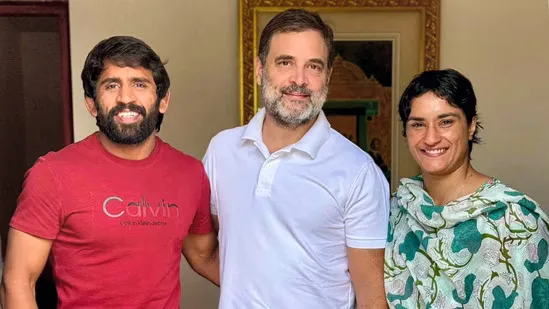On September 6, 2024, the Indian National Congress welcomed two well-known wrestlers, Bajrang Punia and Vinesh Phogat, into its fold ahead of the Haryana assembly elections. The duo joined the Congress party shortly after meeting with its prominent leaders, including Rahul Gandhi and Congress President Mallikarjun Kharge. This decision, however, has raised several eyebrows, especially considering their previous public stance against political involvement and their criticisms of the current government during their protests.
Entry into politics amid allegations and controversies
Vinesh Phogat and Bajrang Punia’s entry into politics has not been without controversy. Both wrestlers were involved in a series of protests against Brij Bhushan Sharan Singh, the former Wrestling Federation of India (WFI) chief and ex-BJP MP, who faces sexual harassment allegations. While the allegations against Singh were severe and deserved due process, the manner in which Punia and Phogat leveraged the protests to gain public sympathy is now being questioned. Many observers noted that their activism seemed to pivot sharply from seeking justice for the alleged victims to an almost overt political manoeuvre, with the two wrestlers frequently appearing at Congress-sponsored events and receiving explicit support from Congress leaders.
During their induction into the Congress, Vinesh Phogat remarked, “I am very proud to be associated with a party that stands up against misbehaviour and injustice against women.” However, critics argue that her statements selectively target the BJP while ignoring similar issues within the Congress’s history. The timing of their political entry, just before the Haryana elections, appears to many as a calculated attempt to capitalise on their newfound fame and sympathy to secure political positions.
Resignation from Indian Railways and suspected motivations
Adding to the controversy, Vinesh Phogat resigned from her position with the Indian Railways, citing “family circumstances and personal reasons.” The abruptness of this resignation has raised questions, particularly given its timing, coinciding with her announcement to join the Congress. Phogat’s resignation letter, which she shared on social media, seemed to project a sense of grievance and martyrdom, as she described her tenure with the Railways as “a memorable and proud time of my life.” However, many view this move as part of a larger strategy to sever any formal ties with government employment, thereby making herself more marketable to a political party known for its opposition to the current central government.
Phogat’s sudden decision to quit her professional commitments, including wrestling, adds another layer of suspicion. She was disqualified from the 50-kilogram gold medal match at the Olympics in Paris for being overweight by 100 grams, an incident that reportedly left her disgruntled. Critics have suggested that Phogat’s entry into politics might be driven more by her frustration with her sporting career’s end rather than any genuine desire to serve the public.
Bajrang Punia’s role and political ambitions
Bajrang Punia, known for his vocal support of the protests and criticisms of the BJP-led government, has been projected as a key figure in the Congress’s campaign in Haryana. He is likely to be appointed co-chairman of the Haryana Congress campaign committee. Reports suggest that Punia is aiming for the Badli seat, while Phogat is likely to contest from Julana or Dadri Vidhan Sabha. Punia’s sudden rise to a prominent position within the Congress has drawn scrutiny, with some observers noting that his political ambitions appear to have been conveniently aligned with the Congress’s strategy to regain power in Haryana.
Their political entry has also sparked debate over their commitment to the causes they championed. While they previously presented themselves as athletes fighting for justice, their political alignment has led to accusations of opportunism. For instance, during the protests, both wrestlers emphasised their independence from any political party. However, their recent actions suggest otherwise, casting doubts on their previous assertions and raising concerns.
Strategic alliance talks and political maneuvering
The Congress party has clearly sensed an opportunity in Haryana’s politically volatile environment. As the elections approach, the Congress has initiated negotiations with the Aam Aadmi Party (AAP) and the Samajwadi Party (SP) for seat-sharing. Sources within the Congress suggest that the party is willing to offer three seats to the AAP and one to the SP in the 90-member Haryana legislature. This strategic alliance-building, coupled with the induction of the wrestlers, seems like an effort to attract votes from different demographic sections — particularly the youth and sports enthusiasts.
However, critics argue that this alliance is more about optics than genuine political alignment or shared ideology. The wrestlers’ sudden appearance on the Congress platform, amidst their battle against alleged harassment and their vocal criticism of the BJP, seems tailored to paint the Congress in a positive light. Their participation in Congress events, public appearances with Congress leaders, and their immediate alignment with the party’s narrative suggest that their actions may be more about personal gain than public service.
Political exploitation of personal struggles?
The decision of Vinesh Phogat and Bajrang Punia to join the Congress appears to be a strategic move by the party to exploit their recent struggles and the public sympathy they garnered during their protests. The Congress’s attempts to present them as “champions of justice” are being viewed by some as a cynical effort to use their recent victimhood narratives to secure votes. Many believe that their protests, which began with a genuine call for justice, have now been transformed into a vehicle for political ambitions.
While Vinesh Phogat and Bajrang Punia have undoubtedly contributed to Indian sports and brought attention to issues of harassment and justice, their recent political moves have somewhat overshadowed their past achievements. Their decision to join the Congress, immediately before a crucial state election, casts a shadow on their previous activism and raises suspicions about their true motives. It remains to be seen whether their foray into politics will yield positive results for them or further erode the public’s trust in their sincerity and integrity.



















Comments